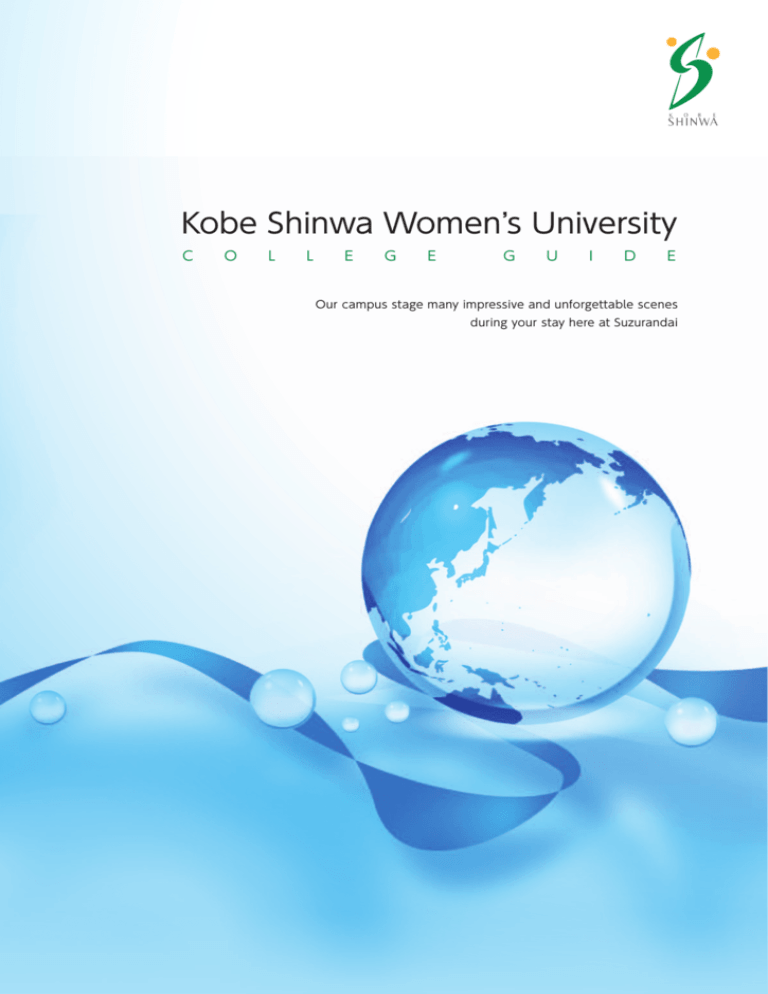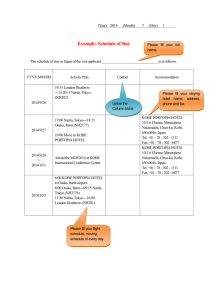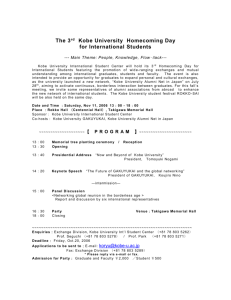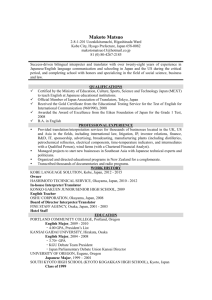Kobe Shinwa Women's University
advertisement

Kobe Shinwa Women’s University C O L L E G E G U I D E Our campus stage many impressive and unforgettable scenes during your stay here at Suzurandai 親 和 に く る と 、い い 顔 に な り ま す ! 1 KOBE SHINWA WOMEN’S UNIVERSITY 2 KOBE SHINWA WOMEN’S UNIVERSITY 3 About Kobe Shinwa Women’s University Kobe Shinwa Women’s University, located in the North Ward of Kobe City, was established in 1966 from Shinwa Girls’ School, which was founded in 1887 as one of the oldest women’s schools in Japan. Since its opening, Kobe Shinwa has been dedicated to educating independent and socially active women who are able to influence the world. Its curriculum is designed to cultivate students as a whole person as well as to enhance their practical professional skills in order to closely engage in the society with a broad perspective. At the heart of Kobe Shinwa’s education values is the founder’s school motto, “Faithfulness, Perseverance, and Clemency.” と 、い い 顔 に Kobe Shinwa has campuses in Suzurandai and Sannomiya, enrolling 2,000 students in undergraduate and graduate programs in its Department of Childhood Education, Department of Cross-Cultural Studies, Department of Psychology, Department of Social Welfare, Department of Junior Sports Education, and Graduate School of Literature. Kobe Shinwa has recognized the importance of educating the students with a global perspective, offering an increasing array of study abroad options in more than ten countries and regions. Education for Women – Founder, Haruko Tomokuni – Shinwa Gakuen Institute was established in 1887 as Shinwa Girls’ School by Ms. Haruko Tomokuni. Her idea and purpose for the establishment was drastically progressive in the time of Meiji era (1868-1912) where she aimed to “educate women who are independent and active in the society.” Ms. Tomokuni addressed; “It is a shame for women with discretion just to be bothered by maintaining households, but they should sometimes step out and work for the public good and contribute to the society, both domestically and globally.” She also noted that she wanted to “educate Japanese women who would cooperate and mutually enhance with people from different countries and races”. The founder was a farsighted person who was aware of the global society. Succeeding her philosophy, Kobe Shinwa Women’s University emphasizes international relations and has established the International Education Research Center in 2014. Ms. Tomokuni left the school motto, “Faithfulness, Perseverance, and Clemency.” It is inherited to Kobe Shinwa Women’s University as well as Shinwa Girls’ Junior and Senior High School as a foundation of their curriculum, and they strongly believe that this educational value indicates the universal way of living as humans. Haruko Tomokuni 1858-1925 KOBE SHINWA WOMEN’S UNIVERSITY 4 President’s Message We nurture proactive and educated women with a broad social perspective Kobe Shinwa Women’s University is located among the green environment of Rokko Mountains, 20 minutes bus ride from the port town, Kobe Sannomiya. Our university was born from Shinwa Girls’ School, which was established in 1887. Our founder Ms. Haruko Tomokuni dreamed of the creation of a “new type of women”. Since then, for more than 125 years, we have nurtured “women who are socially independent and active.” Our educational slogan is “learn from people, and apply it for people.” This means that we constantly interact with the society with a broad perspective and use what we have learned to solve social problems. Our curriculum embodies this slogan by integrating “on-campus” education and “off-campus” education. “On-campus” education means that students raise their cultural level and obtain knowledge and skills through our formal curriculum within the campus. On the other hand, “off-campus” education provides the students opportunities to learn from practice and experience outside the campus. In the “off-campus” education, students face authentic difficulties and problems, and these obstacles motivates them to eagerly learn necessary knowledge and skills to overcome their troubles. This motivation encourages students to learn more in “on-campus” education, and then, they bring forth what they have learned “on-campus” to the “off-campus” practice again. It is the circulation of “on-campus” and “off-campus” learning that makes our students highly educated and well equipped with practical skills. Through this circulation, students obtain power to communicate well with people, power of problem solving, and power to make their dream come true. Kobe Shinwa has opened International Education Research Center in April 2014. With this center, we enhance our research with a global point of view, and enrich our cultural exchange with global partners. Also, we have opened Career Center to support students to think deeper about their lifelong career beyond job hunting. We hope to have our students discover themselves with a global perspective through various programs we offer in Kobe Shinwa Women’s University. President, Hiroyuki Yamamoto 5 KOBE SHINWA WOMEN’S UNIVERSITY The History of Kobe Shinwa Women’s University 1887 Shinwa Girls’ School was established within the precincts of Zensyo-ji temple in Motomachi, Kobe. The history of Shinwa’s sport clubs started 90 years ago 1908 The school changed its name to Shinwa Girls’ High School. School motto was settled as “Faithfulness, Perseverance, and Clemency.” 1916 Ms. Haruko Tomokuni, founder, was conferred the decoration, the Medal with Blue Ribbon, for her long term contribution to education. 1924 Ms. Haruko Tomokuni received the Orders of the Sacred Treasure, Silver Rays. 1947 Shinwa Girls’ Junior High School was opened. Junior high school became compulsory education in Japan. 1917-18 was the time when the importance of 1948 Shinwa Girls’ High School changed its name to Shinwa Girls’ Senior High School. Shinwa’s first sport was volleyball. By 1921, 1966 Shinwa Women’s University started with two departments. Department of English Literature and Department of Japanese Literature. 1972 Department of Childhood Education started. 1987 100th anniversary of Shinwa Gakuen Institute 1994 The university changed its name to Kobe Shinwa Women’s University 2002 Graduate School opened for master’s degrees in Clinical Psychology and Education. 2003 Shinwa Nursery School opened. 2005 Undergraduate was reorganized to two faculties and four departments. Under Faculty of Literature, Department of Cross-cultural Studies. Under Faculty of Human Development and Education, Department of Childhood Education, Department of Clinical Psychology, and Department of Social Welfare. 2006 women’s physical education was recognized. tennis, basketball and table tennis were added, and sports clubs had been established. This was the beginning of the active enrollment of sport clubs of Kobe Shinwa Women’s University. Distance learning started for Department of Childhood Education and Department of Social Welfare. Celebrated 40th anniversary of the university. 2007 120th anniversary of Shinwa Gakuen Institute Chidorigaoka Shinwa NurserySchool opened. 2008 Department of Junior Sports Education started under Faculty of Human Development and Education. The First Ski Club in Hyogo By 1935, ski club was established and this is said to be the first ski club in Hyogo prefecture. The club had already started a training camp at Kannabe highlands in northern Hyogo. Today, Shinwa does not have a ski club, but it offers a “ski” course to succeed its tradition. An American woman who influenced Shinwa’s founder In 1886, Ms. Mary C. Leavitt, a social activist for female suffrage and temperance movement, visited Department of Clinical Psychology changed its name to Department of Psychology. Japan and gave speeches around the country. Ms. 2012 125th anniversary of Shinwa Gakuen Institute took care of Ms.Leavitt, strongly felt the necessity 2016 50th anniversary of Kobe Shinwa Women’s University 2017 130th anniversary of Shinwa Gakuen Institute Haruko Tomokuni, later Shinwa’s founder who for women’s education so that Japanese women could behave in a dignified manner in public as Ms. Leavitt demonstrated. This encounter prompted Ms. Tomokuni to establish Shinwa Girls’ School. The history and the passion for women’s education are represented in Shinwa’s school badge, school slogan, and symbol [ School Badge ] [ School Slogan: “Learn from people, apply it for people.” ] The design consists of a mirror, a chrysanthemum, The slogan reflects the university’s wish for the students to engage closely in and a hollyhock. The mirror in the center represents the society with a broad perspective, and apply what they have learned to a woman’s pure heart. The chrysanthemum, by its resolve social problems. strong beauty, stands for a woman’s strong will to overcome difficulties. The hollyhock is from the family crest of Shinwa’s founder, Ms. Haruko Tomokuni. [ School Symbol ] The initial “S” of Shinwa is redesigned to represent two people holding each other’s hands. The green color stands for the freshness of the breath of life, while the sunshine yellow color stands for the brightness of intelligence. KOBE SHINWA WOMEN’S UNIVERSITY 6 “Shinwa Ryoku” (Power of Shinwa) Students learn to have “Shinwa Ryoku” (Power of Shinwa) in four years 1. Be faithful to people and learning 2. Always be gentle and remain harmonized 3. Keep persevering when solving problems Our balanced curriculum nurtures “Shinwa Ryoku” (Power of Shinwa) in every student, which helps them to be confident and invaluable for the society. Kobe Shinwa’s curriculum emphasizes the circulation of “on-campus” learning and “off-campus” learning. Students apply the knowledge and skills they learned in the classes on campus to the practices and studies outside of the campus. At the same time, they bring back what they experienced “off-campus” to “on-campus” learning. Thus, Kobe Shinwa enhances practical and human skills of every student, and that is, the uniqueness of the education in Kobe Shinwa Women’s University. ON “On-campus” education 7 Learning circulation Balanced learning between “on” and “off” OFF “Off-campus” education Students acquire knowledge and skills Through the experience in the local community with a broad perspective of and the real society, students liberal arts enhance practical skills KOBE SHINWA WOMEN’S UNIVERSITY Child Rearing Support Center, “Suku-Suku” Together with students, Kobe Shinwa supports parents in the local community in their child rearing. Suku-Suku provides a variety of fun programs for children and parents such as cooking and handicrafts with the support of professionals from every kind of fields. Suku-Suku has accepted more than 30,000 parents and children since its opening. This is also a venue for our students to have a precious professional experience. The Center for Community Service This center contributes to social education and lifelong learning of the local community, together with students. It offers public lectures as well as collects information about volunteer work for students. <Kids Open Campus> Kobe Shinwa invites children and parents from the local community. Under the supervision of faculty and staff, students plan and deliver more than 30 programs, such as face-painting, a haunted mansion, cooking, and a panel theater. Every year, more than 300 students and more than 600 children and parents participate in the event. School Supporter System According to the agreement with Kobe City Education Board, students are sent as school supporters to the kindergartens and elementary schools in the city. Kobe Shinwa students voluntarily help teach lessons, support class management, support school events, and help individual learning of the students of the local schools. Kobe Shinwa has also conducted the same kind of agreement with the education boards of Itami, Osaka, Kasai, Katoh, Takarazuka, Toyonaka, Himeji, Miki, and many other areas. Kobe Shinwa has concluded agreements with more than 18 education boards for sending its students as school supporters and with four local governments and companies for volunteer work. KOBE SHINWA WOMEN’S UNIVERSITY 8 Departments & Programs Faculty of Literature Department of Cross-Cultural Studies ● Japanese Language and Japanese Literature Program ● English and International Culture Program ● Kobe and Local Culture Program Faculty of Human Development and Education Department of Childhood Education ● Elementary Education Program ● Early Childhood Education Program ● Nursery Program Nurtures high quality communication skills. Career support program is additionally offered for various future careers. Students can obtain a teacher certificate for high school Japanese or/and English. Varieties of study abroad programs are offered for students to learn culture and language for their global perspectives. Nurtures sophisticated educators who are equipped with the ability to understand children as well as social and human skills. The department offers a unique curriculum in which students have many opportunities to engage with children to enhance their practical skills. We retain a very high level of teacher recruitment record. Department of Psychology ● Psychology for Modern Women Program ● Psychology of Children’ s Mind Program ● Clinical Psychology (Professional of the Mind) Program Depending on their individual goals, students learn various themes of psychology, such as psychology in daily lives or child rearing at clinical and educational fields. Students can build their own curriculum from various programs and courses. The department offers a rich learning environment where teacher-student ratio is 1 : 7 and thus guarantees a close relationship with faculty. Department of Social Welfare Nurtures social welfare professionals who are equipped with knowledge, skills and values. ● Social Welfare Program ● Children Welfare Program The department is proud of its high level of recruitment, and our graduates are very active in the fields such as centers for handicapped people, nursery schools, and hospitals. Department of Junior Sports Education ● Junior Sports Education Program ● Sports Counseling Program ● Sports Management Program Nurture professionals of sports instruction who are equipped with general and practical skills to teach children the benefit of athletics. The department offers a curriculum in which children’s sports and education (instruction) are integrated. The faculty has many teachers who have rich experiences as professional athletes or/and coaches in a professional sports league. Graduate School of Literature Master’ s degree (co-education) ● Clinical Psychology Program ● Education Program 9 KOBE SHINWA WOMEN’S UNIVERSITY Through research and practical experiences, students acquire higher skills for educational practice from both educational and psychological perspectives. Proceeding to a graduate school is an additional career path to learn more professionally. The graduate school offers two major programs whose purposes are to nurture clinical psychologists and educational professionals. Department of Cross-Cultural Studies Faculty of Literature A department where students can find their future career from a wide variety of choices through the course of obtaining the power of language in Japanese and English. [ Program Introduction ] Because students who love reading should seek for different careers after graduation, Department of Cross-Cultural Studies offers 3 different programs Japanese Language and Japanese Literature Nurtures students to acquire skills of expression in Japanese and send messages of Japan’s brilliance to domestic and global communities. Students can obtain a teacher certificate for junior and senior high school in Japanese. Also, this program offers a curriculum to become a Japanese language teacher. English and International Culture From the mouth of a student: Enhances students’ English skills and their capacity to live in multicultural societies. In this program, students will “I have chosen my major in English and be educated about international culture and acquire skills to express their ideas and thoughts in English. Students International Culture for, I was interested in can obtain a teacher certificate for junior and senior high school in English. communication in a different language. I Kobe and Local Culture make my old dream come true to become a am learning English, Chinese and Korean to Students mingle into local cultures and life of local people and do research and analysis. Through the experience, cabin attendant to fly around the world.” students learn skills to contribute to the creation of local culture. License and Certificate besides Bachelor’s Degree • Junior high school level one teacher certificate (Japanese, English) • Teacher librarian*1 • Librarian • Senior high school level one teacher certificate (Japanese, English) • Elementary school level one teacher certificate (by distance learning of Kobe Shinwa)*2 *1 Obtaining teacher certificate is necessary. *2 By taking distance learning program in addition to regular program. (Additional tuition required) Department of Childhood Education Faculty of Human Development and Education Through learning, experience, and its unique support programs, Department of Childhood Education nurtures students to be effective in the educational fields, and grants students necessary licenses and certificates. [ Program Introduction ] Three practical programs for different kinds of teachers Elementary Education Nurtures students to be equipped with the wide variety of skills and knowledge to become elementary school teachers. License and Certificate Elementary school level one teacher certificate Kindergarten level one teacher certificate or Special education level one teacher certificate Early Childhood Education Students acquire necessary skills such as in music and arts, as well as knowledge and theories about early childhood From the mouth of a student: education. “I remember, an encounter with a teacher made me love my kindergarten when I hated to leave my mother in the morning when I was a child. Now, finding her an alumna of Kobe Shinwa makes me feel encouraged. I am eager to obtain nursery teacher certificate with a great memory about my practicum experience with small children.” License and Certificate Kindergarten level one teacher certificate Nursery teacher certificate, Elementary school level one teacher certificate or Special education level one teacher certificate Nursery Students acquire perspectives necessary for nursery care as well as practical skills and knowledge. License and Certificate Nursery teacher certificate Kindergarten level one teacher certificate License and Certificate besides Bachelor’s Degree • Elementary school level one teacher certificate • Kindergarten level one teacher certificate • Special education level one teacher certificate (limited for 50 students) • Teacher librarian • Nursery teacher certificate (limited for 130 students) • Librarian KOBE SHINWA WOMEN’S UNIVERSITY 10 Department of Psychology Faculty of Human Development and Education Not only do we offer a wide variety of knowledge applicable for daily lives, but students can also learn deeper knowledge of psychology to become a professional in this field. The curriculum also supports students who are interested in becoming a certified clinical psychologist by proceeding to the graduate study. [ Program Introduction ] Department of Psychology supports students’ motivation for learning. Students can attend at as many courses as they want from the three different programs. Psychology for Modern Women Students study psychology of women’s daily lives in different aspects such as make-up, foods, and music. Psychology of Children’s Mind From the mouth of a student: Nurtures students to obtain skills to resolve problems of modern children by understanding their development and “My dream is to become a teacher who is always close to children, thinking about their happiness. Focusing on my major “Psychology of Children’s Mind”, I am also taking many courses from different programs. I will start learning in the distance learning program to obtain elementary teacher certificate very soon.” minds. Clinical Psychology (Professional of Mind) Offers a substantial curriculum in which students learn about psychological experiments, psychological practice, clinical psychology practice, and counseling required for a professional of the mind. This program is also for the students who will proceed to the graduate study. License and Certificate besides Bachelor’s Degree • Certified psychologist (“Nintei shinrishi”) • Certified after-school childcare worker • Librarian • Elementary school level one teacher certificate or Kindergarten level one teacher certificate (by distance learning of Kobe Shinwa)*1 • Qualification for industrial counselor (“Sangyo counselor”) examination *2 *1 By taking distance learning program in addition to regular program. (Additional tuition required) *2 Qualification was granted individually by “Sangyo counselor kyoukai” (JAICO), referring to the candidate’s college grades. Department of Social Welfare Faculty of Human Development and Education We support students’ effort to obtain licenses and certificates. Students take active roles in the local social welfare activities and actively work in the relationship with the people in the fields. [ Program Introduction ] Students can choose the closest program for their future work place. Social Welfare Offers curriculum for students to obtain the certification of certified social worker, which is required in many fields in the society, such as in public health and welfare offices and in child guidance centers. Children Welfare From the mouth of a student: Offers curriculum for students to become a nursery school teacher as a professional of social welfare who works not “My goal is to become a nursery school only in a nursery care center, but also in a children’s home, in a facility for children with intellectual disability, and in a hospital. teacher who can share joy and happiness with children like their parents. With my experience with my own grandfather, not only from my major “children welfare program,” but also do I take courses from “social welfare program” to learn about care License and Certificate besides Bachelor’s Degree • Qualification for Certified social worker national examination • Nursery teacher certificate (limited for 40 students) • Kindergarten level one teacher certificate (by distance learning of Kobe Shinwa)*1 *1 Obtaining teacher certificate is necessary. 11 KOBE SHINWA WOMEN’S UNIVERSITY for senior people. I found the guide helper practice in the summer was very helpful.” Department of Junior Sports Education Faculty of Human Development and Education Students obtain licenses and certificates through the practicum and the relationship with children in the local communities. We aim to educate students who create the future through athletics. [ Program Introduction ] Students can choose programs, depending on their future career as a school teacher, as a sports instructor, or as a business person in the field of athletics. Junior Sports Education From the perspective of supporting children’s development, students learn knowledge and theories of sports education to become a teacher in health and physical education who can bring out children’s abilities. Sports Counseling From the mouth of a student: Students learn sports psychology and become a sports instructor who can resolve the psychological problems that “I became eager to be an instructor by my experience in my high school when I played an important role in the team to connect players and coaches. Now, I am learning for teacher certificate in health and P.E. In addition, I will start distance learning for elementary teacher certificate soon. There are much more I want to learn, such as for sports leader certificate.” children face. Sports Management Students acquire management skills required for the sports business, and become a businessperson who can apply the skills to the sports events of local communities and in the cooperate environment in the field of sports and healthcare. License and Certificate besides Bachelor’s Degree • Junior high school level one teacher certificate (health and physical education) • Senior high school level one teacher certificate (health and physical education) • Sports leader certified by Japan Sports Association • Qualification for junior sports instructor examination • Qualification for assistant manager examination • Teacher librarian, Librarian • Sports instructor for disabled certified by Japan Sports Association for the Disabled (novice, intermediate) • Elementary school level one teacher certificate or Kindergarten level one teacher certificate (by distance learning of Kobe Shinwa)*1 *1 By taking distance learning program in addition to regular program. (Additional tuition required) Clinical Psychology Program, Graduate School of Literature Students acquire necessary knowledge and practical skills for the profession of psychology through research and practice experience. The purpose of the clinical psychology program is to educate students to become certified clinical psychologists as a professional who support people who need professional care and for people’s psychological development. Not only do the students conduct their research, but also they can accumulate consulting experience in the psychology and education counseling office located in the university campus. Outside the university campus, they obtain knowledge and practical skills necessary for clinical psychologist by practicing in a hospital, children’s home, and a child consultation center. Education Program, Graduate School of Literature Students acquire higher skills for educational practice from both educational and psychological perspectives. The goal of the educational program is to nurture the student’s professional knowledge, problem solving skills, and educational leadership, which are required for the leaders in the field of education. Focusing on how they can overcome the difficulties and issues of today’s education, students pursue their researches in the field of education and psychology, and deepen and widen their understandings of education. Also, students can obtain a school counselor certificate with which they offer psychological support service for children, parents, teachers and other stakeholders in schools. Students become a professional who practice education from both of educational and psychological perspectives. KOBE SHINWA WOMEN’S UNIVERSITY 12 Study Abroad Programs Kobe Shinwa Women’s University offers an increasing array of study abroad programs in order to strengthen students’ global sense with a multicultural perspective, which is necessary for various professionals across different areas in today’s society. Overseas Study of Art & Education, Italy Through a rich artistic and cultural experience in Italy, students learn sensibility to art and culture and become aware of different cultures. Students visit museums and theaters as well as observe educational practices at “Casa dei bambini,” Montessori school in Milan, to learn about sensory education and nursery care. Overseas Education Study, Toronto, Canada In this program, students do teaching practice at public elementary schools and the JICS lab school at the University of Toronto. In the teaching practice, students perform lessons such as reading picture books for the children or introducing Japanese culture such as fairy tales and origami. Through the experience in schools, students learn the openness of Canadian education to immigrants and multicultural diversity. Overseas Psychology Study, Toronto, Canada This program develops students’ better understanding about the role of psychology in the field of education and health care. In elementary schools and medical settings in Toronto, students learn treatments for children who need special care, psychological assessment, and art therapy through observation and practice. Overseas Study of Teaching Japanese Language, Sydney, Australia This program is to foster students’ teaching skills as a Japanese teacher for native English speaking people. Students participate in Japanese language courses at the University of Sydney to observe and teach lessons. Overseas Social Welfare Seminar, Sweden Students experience and think about social welfare in an advanced country in the field. This program includes visits to the facilities for children/disabled/elderly, accommodations such as Group Homes, and a welfare equipment development center. Students can learn social welfare from different perspectives. 13 KOBE SHINWA WOMEN’S UNIVERSITY Study Abroad Program: Korean Culture, Seoul, Korea Shinwa students meet students from Seoul Women’s University. Through the interaction, in addition to Korean language, this program provides the opportunity for Shinwa students to learn Korean history and culture. Students will understand "The closest country to Japan,” through homestay and interaction with friends from the same generation in Korea. Overseas Sports Education and Cultural Study, Shanghai, China At Shanghai University of Sport, students attend lectures about sports training, sports management and sports business in China. Overseas English Seminar/ Overseas Studies of English and Culture, Toronto, Canada Intensive English Courses for 4 weeks or 8 weeks at the School of Continuing Studies at the University of Toronto. Overseas Language Seminar, Sydney, Australia Students study English in the Center for English Teaching at the University of Sydney. This is a three-week intensive language course. In addition, the CET customized its program especially for Shinwa students to enhance their presentation skills in English. Partner Universities and Institutes University of California, Berkeley, the United States of America Northeast Normal University, Jilin Province Changchun, China School of Continuing Studies, University of Toronto, Canada Soochow University, Suzhou, Jiangsu Province, China Dr. Eric Jackman Institute of Child Study Laboratory School, Shanghai University of Sport, Shanghai, China Toronto, Canada City Institute, Dalian University Of Technology, China Istituto Maria Consolatrice, Milan,Italy Information Engineering Institute, Dalian Jiaotong University, China Seoul Women’s University, Seoul, Korea East China Normal University, Shanghai, China KOBE SHINWA WOMEN’S UNIVERSITY 14 Haneda Airport Narita Airport Osaka Airport Kobe Airport Kansai International Airport [ Access ] From Kansai International Airport: Limousine Bus Service → Sannomiya, 90 minutes From Osaka Airport: Limousine Bus Service → Sannomiya, 40 minutes From Kobe Airport: Port-liner Service → Sannomiya, 30 minutes From Kyoto: JR Tokaido line, Special Rapid Service → Sannomiya, 50 minutes From Osaka: JR Tokaido line, Special Rapid Service → Sannomiya, 20 minutes 7-13-1 Suzurandai Kitamachi, Kobe 6511111, Japan +81-78-591-1651






